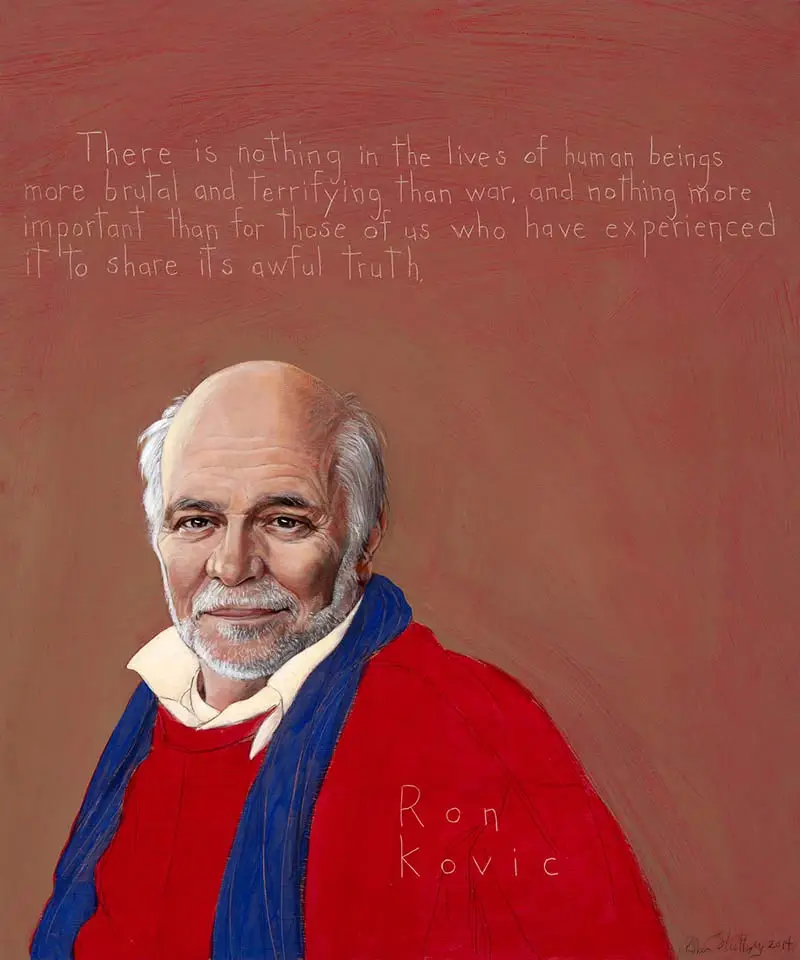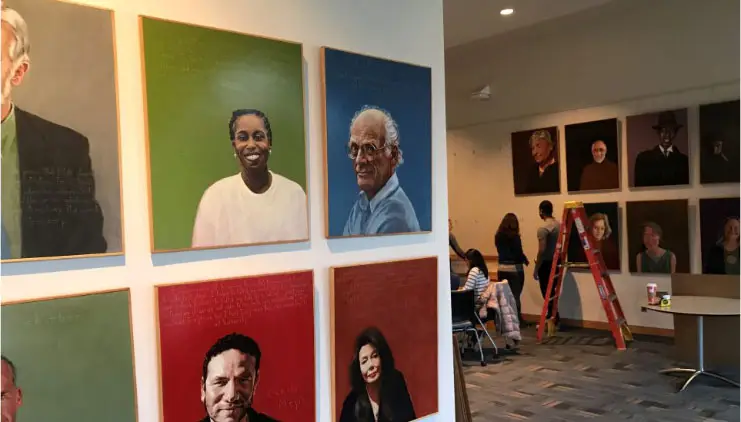
Ron Kovic
Ron Kovic
Anti-war and Veterans Rights Activist : b. 1946
“There is nothing in the lives of human beings more brutal and terrifying than war, and nothing more important than for those of us who have experienced it to share its awful truth.”
Biography
Ron Kovic was born on the 4th of July, 1946, in Ladysmith, Wisconsin. His parents soon moved to Massapequa, New York, where he was raised to be a proud patriot in a family with a history of military service. While his mother kept an eye on Ron and his five younger siblings at home, his father worked as a supermarket clerk. During high school, Kovic excelled in wrestling, track and baseball, but not academics. He considered a career as a professional baseball player but then found himself imagining a different path, inspired by President John F. Kennedy’s powerful challenge: “Ask not what your country can do for you; ask what you can do for your country.” Just a few months after graduating high school, in September of 1964, a local military recruiter signed him into the United States Marine Corps.
Kovic volunteered for duty and was deployed to Vietnam in December of 1965 as a member of the 3rd Battalion, 7th Marines H&S Company. Many soldiers are frightened and confused when first exposed to the speed and intensity of battle and Kovic was no exception. But after a 13-month tour of duty and visit home , he still believed in the importance of the war to stop the spread of Communism in Vietnam and volunteered to return. On his second tour of duty, during a quick and confusing ambush by a North Vietnamese Army unit near a village along the Cua Viet River, he accidentally shot a young U.S. corporal. His superiors refused to hear his confession, which only deepened his moral anguish. Then, during a night raid, Ron and fellow soldiers were ordered to shoot into a small Vietnamese hut where they believed enemy soldiers were hiding. But the hut had no enemies in it – only women and children left screaming, mangled or dead. Ron was horrified by these battlefield tragedies.
On January 20, 1968, while leading his squad across an open area in the demilitarized zone north of the Cua Viet River, Kovic was shot. As a result of the terrible guilt he carried from the previously mentioned incidents, he purposely had exposed himself to enemy fire. He was shot first in the right foot, then again through the right shoulder, suffering a collapsed lung and a spinal cord injury that would leave him paralyzed from the chest down. The first Marine who tried to save him was killed. A second Marine carried Kovic to safety through intense fire. But later that afternoon, this second Marine also was killed on the battlefield. Kovic spent a week in an intensive care ward in Da Nang and then was returned to the U.S. for further treatment. The government awarded him a Bronze Star with a “V” (denoting valor) and the Purple Heart for his service, courage, and injuries. But Kovic, haunted by his experiences in war and adjusting to a life-changing injury, took no solace in these accolades. And the apathetic treatment he received at the poorly equipped veterans administration hospital did little to assuage his feelings of guilt and regret.
Kovic had joined the Marines to become a hero. Instead, he felt, “betrayed and could not understand why my government had not done all that it could to win the war.” Over time, Kovic understood that war wasn’t all about heroism and that America did not truly respect its soldiers’ sacrifices. As he looked back on his miserable time in the Veterans’ hospital, he was left “wondering how our government could spend so much money (billions of dollars) on the most lethal, technologically advanced weaponry to kill and maim human beings but not be able to take care of its own wounded when they came home.” Paralyzed physically and tortured psychologically, Kovic had no answers to the questions he faced about war. However, he had a unique voice to share with audiences and sought an outlet for his outrage in activism. He began speaking out for peace at anti-war rallies and did interviews on behalf of Vietnam Veterans of America, a non-profit organization dedicated to the support and care of veterans and their families.
Kovic attended the 1972 Republican National Convention. During President Nixon’s acceptance speech, Kovic, from his wheelchair, famously told a reporter, “I’m a Vietnam veteran. I gave America my all, and the leaders of this government threw me and others away to rot in their VA hospitals. What’s happening in Vietnam is a crime against humanity.”
Four years later, Kovic again gained national attention at the Democratic National Convention, where he had been invited to speak. That same year, he published his autobiography, Born on the Fourth of July, a searing account of his experiences in Vietnam and as a returning veteran. A film of the same name, based on Kovic’s book, was released thirteen years later with Tom Cruise starring as Kovic. The film won two Academy Awards and several Golden Globe Awards, but, most importantly, it shone a Hollywood-bright light on Kovic’s activist causes and anti-war message.
Kovic took part in several anti-war demonstrations against the first Gulf War in 1990 and 1991. Following the U.S. bombing of the Chinese embassy in Yugoslavia in 1999, Kovic met in Washington D.C. with China’s ambassador to the U. S. to express his sincere condolences and present the ambassador with two dozen red roses.
From his wheelchair Ron Kovic has led many peaceful protest marches throughout the decades. He feels responsible for warning people about the brutality of war, the realities of being forsaken as a war veteran, and letting people know about the hopeful power of peace. His later activism includes advocating for the development of a Los Angeles facility for homeless and disabled veterans. Kovic continues to speak in favor of peace, non-violent activism, and improvements to the way veterans are treated when they return home from battle. And he has written two more autobiographical books chronicling his journey, his support for veterans, and his fierce belief in the peaceful resolution of conflicts.
In a world where films regularly glamorize war, Ron Kovic symbolizes a different kind of war hero: a hero of truth, forgiveness, and peace. Ron says about his experience after the war,
“I became a messenger, a living symbol, an example, a man who learned that love and forgiveness are more powerful than hatred, who has learned to embrace all men and women as my brothers and sisters. No one will ever again be my enemy, no matter how hard they try to frighten and intimidate me. No government will ever teach me to hate another human being. I have been given the task of lighting a lantern, ringing a bell, shouting from the highest rooftops, warning the American people and citizens everywhere of the deep immorality and utter wrongness of this approach to solving our problems, pleading for an alternative to this chaos and madness, this insanity and brutality. We must change course.”
Programs
Americans Who Tell the Truth (AWTT) offers a variety of ways to engage with its portraits and portrait subjects. Host an exhibit, use our free lesson plans and educational programs, or engage with a member of the AWTT team or portrait subjects.

Education
AWTT has educational materials and lesson plans that ask students to grapple with truth, justice, and freedom.

Exhibits & Community Engagement
AWTT encourages community engagement programs and exhibits accompanied by public events that stimulate dialogue around citizenship, education, and activism.